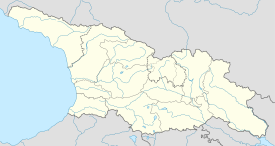Tsirkoli church of the Mother of God
| Tsirkoli church of the Mother of God | |
|---|---|
 Tsirkoli church of the Mother of God | |
| Location | |
| Location | Tsirkoli,South Ossetia/Mtskheta-Mtianeti,Georgia |
| Geographic coordinates | 42°10′16″N44°28′29″E/ 42.170989°N 44.474621°E |
TheTsirkoli church of the Mother of God(Georgian:წირქოლის ღვთისმშობლის ეკლესია,romanized:ts'irkolis ghvtismshoblis ek'lesia) is an 8th–9th-centuryGeorgian Orthodoxchurch near the village of Tsirkoli in theKsani rivervalley. It combines the features of domeless and domed church designs and is classified as belonging to the "transitional period" of medieval Georgian architecture. The area, part of theAkhalgori Municipality,came under the control ofRussianandSouth Ossetianforces in the August 2008Russo-Georgian War.As a result, the Georgian clergy and parish lost access to the church, which is inscribed on Georgia'sImmovable Cultural Monuments of National Significance.[1]
Location
[edit]The Tsirkoli church of the Mother of God stands northwest of the village of Tsirkoli, on the right bank of the Ksani River. The village, also known as Tsirkvali in historical records, is first mentioned in the medieval Georgian chronicles when relating the events in 975. It is home to another, late medieval church of St. George and a ruined fortress, located nearby.[2]
Layout
[edit]The church of the Mother of God is built of poroustuff.It has the centrally located dome, which is without a drum, rests onsquinches,and is vaulted with agable roof,imparting an outward appearance of asingle-navebuilding. At the east end of the interior there is asanctuary,with a semicircularapseand side chambers. The west part of the interior is two-storeyed, each floor connected to the central squarebaythrough a pair of arched openings. The east façade has apediment,crowned by a simplecornice.Between the pediment and a double-arched window below it there is a large rectangular recess, probably made to accommodate an inscription—a project that did not materialize. In the centre of the south façade there are three interconnected arched niches surmounted by a double window, which is adorned with exquisite stone carvings. The central niche serves as a doorway into the building.[3][4]A stone inscription from the church, made in the medieval Georgianasomtavruliscript and mentioning KingLeon III of Abkhazia,is dated to the period of 957–967 and is preserved at theGeorgian National MuseuminTbilisi.[2]The layout of the dome and east façade are unusual in the medieval Georgian church architecture.[5]
The interior bears fragments of the 10th–11th-century frescoes. Better preserved are the depictions of the saintsFebroniaand Marianus, with identifying Georgian inscriptions, in the central bay. Also, there are about a dozen scratched graffiti in the church,paleographicallydated from the 14th century to the 17th, commemorative or left by pilgrims.[6]
Current status
[edit]The Tsirkoli church of the Mother of God, significantly damaged by an earthquake, was substantially repaired by the Georgian government between 2006 and 2008.[3]After the Russo-Georgian War of August 2008, the Georgians could no more operate the church. In August 2009, Georgia accused Russia of putting the historical monuments of Tsirkoli at a risk due to new military installations in the area.[7]
References
[edit]- ^"List of Immovable Cultural Monuments"(PDF)(in Georgian). National Agency for Cultural Heritage Preservation of Georgia.Retrieved25 July2019.
- ^abGamkrelidze, Gela; Mindorashvili, Davit; Bragvadze, Zurab; Kvatsadze, Marine, eds. (2013). "წირქვალი [Tsirkvali]".ქართლის ცხოვრების ტოპოარქეოლოგიური ლექსიკონი[Topoarchaeological dictionary of Kartlis tskhovreba (The history of Georgia)](PDF)(in Georgian). Tbilisi: Georgian National Museum. pp. 615–616.ISBN978-9941-15-896-4.
- ^abMuskhelishvili, David; Tumanishvili, Dimitri; Gagoshidze, Iulon; Apakidze, Joni; Licheli, Vakhtang (2008). Skinner, Peter (ed.).The Cultural Heritage of Georgia — Abkhazeti, Shida Kartli(PDF).Tbilisi: Georgian Arts and Culture Center. pp. 1, 13.
- ^Dzhanberidze, Nodar; Tsitsishvili, Irakli (1996).Architectural Monuments of Georgia.Stroyizdat. p. 8.ISBN5274022235.
- ^Beridze, Vakhtang (1974).ძველი ქართული ხუროთმოძღვრება.(in Georgian). Tbilisi. pp. 40–41.
{{cite book}}:CS1 maint: location missing publisher (link) - ^Gelashvili, Irakli (2009)."წირქოლის ღმრთისმშობლის ეკლესიის ნაკაწრი წარწერები"[Scratched graffiti from the Church of Tsirqoli Mother of God](PDF).The Proceedings of Institute of History and Ethnology(in Georgian).9:195–203.
- ^Kupunia, Mzia (3 August 2009)."Russia claims Tbilisi is creating provocations in conflict zone".The Messenger Online.Retrieved18 August2019.

